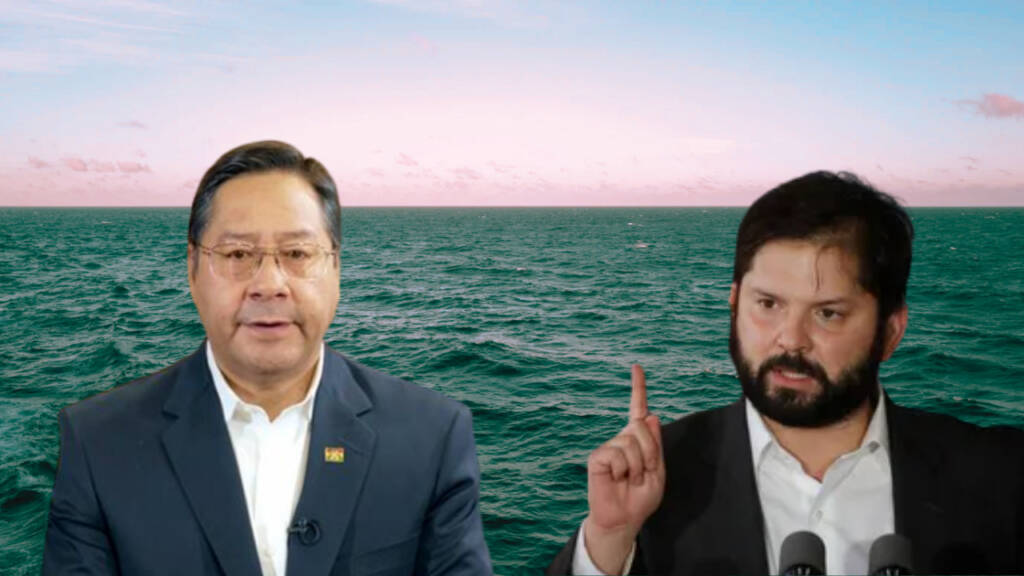The long and complex battle for Bolivia’s access to the Pacific Ocean has been raging for over a century, with the legacy of the British Empire’s involvement in the War of the Pacific still looming large.
Though Bolivian President Luis Arce is determined to see Bolivia regain access to the sea. And, he won’t shy away from a war against Chile this time.
March 23rd is celebrated as Day of the Sea in Bolivia. This March 23rd, President Luis Arce asserted that his government is determined on regaining access to the Pacific Ocean for Bolivia. He mentioned that being a country without sea access results in yearly economic losses of 1% of its gross domestic product (GDP).
He is also searching for a new era in Bolivia-Chile relationships, in order for “a sincere and workable dialogue” to be held to tackle the issues that have divided the two nations for centuries.
Arce pointed out that Bolivia lost its access to the sea because of the “War of the Pacific,” which was “prompted by imperialist interests.
Bolivia’s battle for Pacific
Bolivia’s battle for Pacific access against Chile is a long and complex one, with a history that stretches back to the 19th century. It is part of a larger struggle against British imperialism in Latin America, and is closely linked to the legacy of the War of the Pacific (1879-1883).
In this war, Chile invaded Bolivia’s Litoral department on the pacific coast, thereby leaving Bolivia landlocked. The motivation for this invasion was the refusal of the British Empire to pay a new tax imposed by Bolivia on the joint Chilean and British companies operating in Bolivia’s Litoral department. This tax was aimed at protecting the natural resources in the region, namely guano, sodium, nitrate, and copper, all of which were under the control of British industrialists.
The British Empire provided Chile with the financial support it needed to launch the invasion, as well as with arms and logistical support. The Bolivian and Peruvian forces were no match for the Chilean army, and Chile eventually seized Peru’s southern regions, as well as Bolivia’s coastal towns like Antofagasta. The war left Bolivia landlocked, and deprived it of 1.5% in annual economic growth. Furthermore, the natural resources in Litoral fell into the hands of a tiny number of British-linked oligarchs who exported them at cheap rates to the Global North.
Bolivia has not given up its demand to return to the coast. It still maintains a navy in preparation, the only landlocked country in the world to do so. The government of Luis Arce is hoping to negotiate the issue with Chile’s new President Gabriel Boric. However, Chile so far has refused to comply. This has only served to increase tensions between the two countries.
The struggle for access to the Pacific is closely connected to the legacy of British imperialism in Latin America. British interests had penetrated every port city of the Americas and sought to establish informal control of Latin American natural resources.
This was done by playing off the newly independent republics against each other and encouraging separatism among local elites. Because of the war, Chile ended up incurring huge debts to Britain. This war was more than 140 years ago, but for Bolivians, it remains an open wound.
Also Read: Falklands Islands dispute: Argentina ramps up its defense against imperialist Britain
The struggle for Pacific access is also a political battle to roll back the hidden legacy of British imperialism in Latin America. It is clear that the British Empire benefited from the War of the Pacific by controlling the resources of the region. The only losers were the people of Bolivia and Chile, who lost out economically and suffered immense casualties in the war.
The Bolivian President is committed to achieve access to the sea once again. It is a struggle that has been going on for over a century, but Bolivia is determined to succeed. The government of Luis Arce is hoping to come to a peaceful resolution with Chile through negotiations, and it remains to be seen whether or not this will be achieved.
However, in the past Evo Morales, the ex-President of Bolivia, had sought to leverage the controversy around the Silala river as a means of bargaining chip to reclaim Bolivia’s access to the Pacific Ocean; a privilege Bolivia had lost to Chile as a result of a war in the nineteenth century. Bolivia even planned to deprive Chile of the water from the river. Bolivia also maintains a navy and won’t shy away from war. Therefore, the fight for Pacific access is an important part of the struggle against British imperialism in Latin America, and a victory for Bolivia would be a major blow to the legacy of colonialism in the region.
https://www.youtube.com/watch?v=2ukB4OIuO9o
